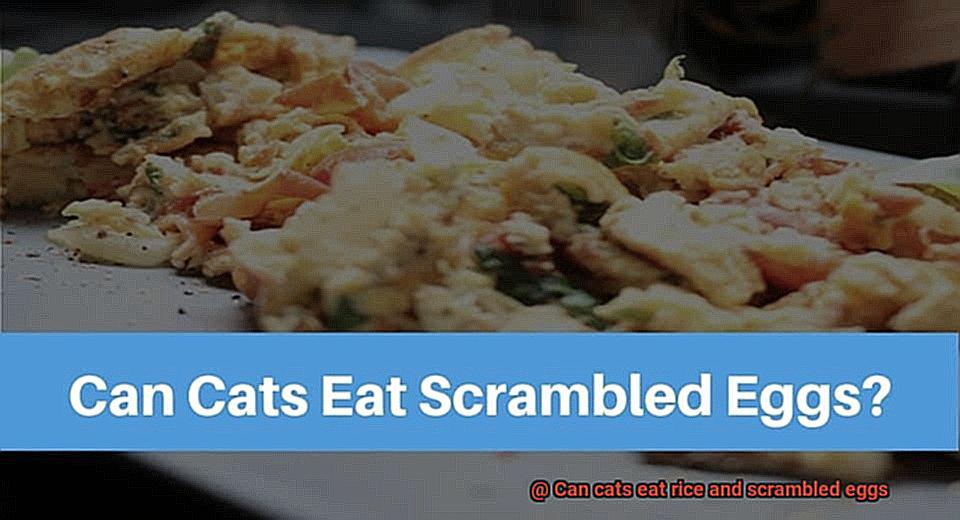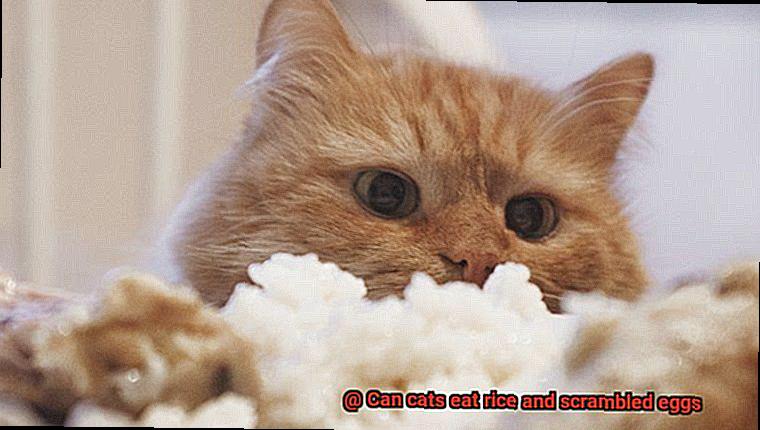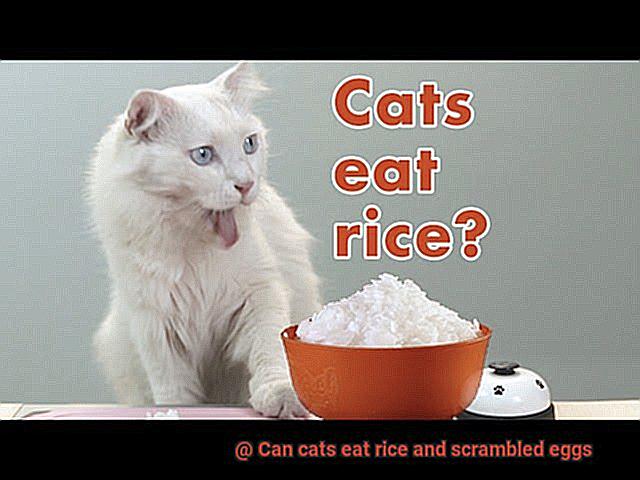As cat parents, we all strive to provide our feline friends with a well-rounded and nutritious diet. But when it comes to sharing human food with them, the line between safe and harmful can be blurry. So, can cats eat rice and scrambled eggs? Let’s find out.
Have you ever caught your kitty eyeing your plate of scrambled eggs and rice? It’s a common sight for many pet owners. While it may be tempting to share your meal with them, it’s crucial to do your homework before offering them human food.
Rice and scrambled eggs are popular human foods that are also safe for cats to consume. In fact, many high-quality cat foods include rice as a source of carbohydrates and minerals. Scrambled eggs are rich in protein and can be a healthy addition to their diet too.
In this article, we’ll explore the pros and cons of feeding your cat these two foods, along with some tips on how to prepare them safely. So let’s dive in and see whether rice and scrambled eggs are suitable for your furry companion’s taste buds.
What is Rice?
Rice is a time-honored, versatile, and nutritious staple food that has been consumed by humans for centuries. It is a cereal grain that is harvested from the grass species Oryza sativa or Oryza glaberrima and is one of the most widely consumed grains in the world. Rice is a major dietary component in many Asian, African, and Latin American countries and has numerous health benefits.
Rice is an excellent source of carbohydrates that provides energy to the body while being low in fat and high in fiber, making it a healthy addition to any diet. It also contains essential vitamins and minerals such as thiamin, niacin, and iron that are crucial for maintaining good health. With a variety of rice available, each with its unique flavor and texture, there are options for every palate.
When it comes to feeding rice to cats, it’s important to remember that cats are obligate carnivores. Their diet should consist mainly of meat-based protein sources. While rice can be safe for cats to consume in moderation, it should not replace their regular cat food. Some cats may have difficulty digesting grains such as rice, which can lead to digestive issues such as diarrhea or constipation. Therefore, it’s best to consult with a veterinarian before introducing any new foods into your cat’s diet.
If you do decide to feed rice to your cat, it’s recommended to choose brown rice over white rice. Brown rice is a whole grain that has not had its outer layer removed during processing, which means it retains more of its nutritional value than white rice.
Is Rice Safe for Cats to Eat?

The good news is that cats can eat rice, but there are a few important things to keep in mind.
Firstly, it’s crucial to understand that cats are obligate carnivores, which means that meat is the primary source of their nutrition. While rice can provide them with energy and some nutrients, it should only be given in moderation and not relied on as the main source of their diet.
Here are a few more reasons why cats can eat rice:
- Carbohydrates for energy: Rice is an excellent source of carbohydrates, which can provide your cat with the energy they need to stay active and healthy.
- White rice is easier to digest: Unlike brown rice, white rice is lower in fiber and easier for your cat’s digestive system to process. This makes it a great option for cats with sensitive stomachs.
- Brown rice contains more nutrients: If your cat doesn’t have any digestive issues, brown rice might be a better choice since it contains more nutrients like fiber and vitamins.
- Plain, cooked rice is safest: When giving your cat rice, make sure it’s plain and cooked without any added seasonings or spices that could be harmful to their health.



What is Scrambled Eggs?
Essentially, they are eggs that have been whisked and cooked in a pan with either butter or oil and seasoned with salt and pepper. However, this classic breakfast dish can also be enhanced with other ingredients like cheese, veggies, or meat to make it even more delicious.
But did you know that scrambled eggs can also be a healthy addition to your cat’s diet? While cats require a diet high in animal-based protein, eggs can provide them with essential nutrients and protein. However, it’s vital to prepare the eggs correctly.
When feeding scrambled eggs to your feline friend, it’s crucial to avoid adding any seasoning or ingredients that could be harmful to them, such as salt, pepper, cheese, or milk. Additionally, cooking the eggs thoroughly is essential to prevent any risk of Salmonella poisoning.
While scrambled eggs can be part of your cat’s balanced diet, they should not be their main source of nutrition. Remember that cats are obligate carnivores and require a diet high in protein from animal sources. Consult with your veterinarian before making significant changes to your cat’s diet.
In conclusion, scrambled eggs are not only a delicious breakfast dish but can also be a healthy addition to your cat’s diet when prepared safely. Here are some key takeaways:
- Scrambled eggs are made by whisking eggs and cooking them in a pan with butter or oil.
- Eggs can provide essential nutrients and protein for cats, but they should not be their main source of nutrition.
- Avoid adding any seasoning or ingredients that could be harmful to your cat.
- Cook the eggs thoroughly to prevent any risk of Salmonella poisoning.
- Always consult with your veterinarian before making significant changes to your cat’s diet.


Is Scrambled Eggs Safe for Cats to Eat?
When it comes to scrambled eggs, you may wonder if it’s a good option. Well, the good news is that scrambled eggs are safe and nutritious for cats – with some important considerations.
Cats are obligate carnivores, which means they require a diet high in animal-based protein. Scrambled eggs are an excellent source of protein and contain essential amino acids that cats need to maintain their health. However, it’s important to note that raw eggs should never be fed to cats. Raw eggs can harbor harmful bacteria like Salmonella and E. coli, leading to severe gastrointestinal issues or even death.
Cooked eggs, on the other hand, are safe for cats to eat in moderation. Make sure the eggs are cooked thoroughly and avoid adding seasoning or salt as these can be harmful to cats. Additionally, it’s crucial to keep in mind that some cats may be allergic to eggs. So, it’s best to monitor your cat’s reaction when introducing this food into their diet.
It’s worth noting that scrambled eggs should be a part of a balanced diet and not the only source of nutrition for your cat. High-quality commercial cat food that meets all of their nutritional needs is still the best option. Moreover, it’s always best to consult with your veterinarian before making any significant changes to your cat’s diet.
Benefits of Eating Rice and Scrambled Eggs for Cats
While some human foods can be harmful to cats, rice and scrambled eggs can be safe and even beneficial when added to their diet in moderation.
Rice is a humble grain that is a good source of carbohydrates for cats. It is easy to digest, provides energy to cats, and helps regulate their bowel movements. Brown rice, in particular, is an excellent source of fiber that can prevent constipation and other digestive issues in cats. However, it’s essential to remember that rice should only be given in moderation as it contains high levels of carbohydrates that can lead to obesity and other health problems if overconsumed.
Scrambled eggs are a breakfast staple that can also be a nutritious addition to your cat’s diet. Eggs are an excellent source of protein, which is essential for muscle growth and repair in cats. Scrambled eggs can add some variety to your cat’s diet while providing them with essential amino acids, vitamins, and minerals. However, it’s crucial to cook the eggs thoroughly before serving them to your cat as raw eggs can contain harmful bacteria like salmonella.
To sum up, rice and scrambled eggs can be beneficial additions to your cat’s diet when given in moderation. They provide essential nutrients that can help regulate digestion and support muscle growth. However, it’s always best to consult with your veterinarian before adding any human food to your cat’s diet.
Incorporating these foods into your cat’s diet can provide benefits such as:
- Providing an additional source of carbohydrates and fiber from the rice
- Supporting muscle growth and repair through the protein in eggs
- Regulating digestion and preventing constipation
- Adding variety to your cat’s diet
Precautions When Feeding Your Cat Rice and Scrambled Eggs
While these foods can offer some nutritional benefits, it’s crucial to take precautions to ensure your furry friend stays healthy and happy. As an expert in the field, I’ve compiled some essential tips and guidelines to help you out.
First and foremost, remember that cats are obligate carnivores and require a meat-based diet. While rice and eggs can be a nutritious addition, they should never replace a balanced diet. If you’re planning on incorporating these foods into your cat’s meals regularly, consult with a veterinarian or veterinary nutritionist first to ensure your cat’s nutritional needs are met.
Next, it’s essential to prepare the rice and scrambled eggs correctly. Rice should be cooked thoroughly without any added seasonings or spices, which can be harmful to cats. Similarly, scrambled eggs should be cooked plain without any added salt or butter. Additionally, avoid using non-stick pans or utensils that may contain harmful chemicals like Teflon.
Lastly, keep an eye on your cat’s reaction to these foods. While most cats can tolerate small amounts of rice and scrambled eggs without any issues, some may experience digestive upset or allergic reactions. Watch for signs of vomiting, diarrhea, lethargy, itching, swelling, or difficulty breathing. If you notice any of these symptoms after feeding your cat rice and scrambled eggs, discontinue the food immediately and contact your vet.
In conclusion, adding rice and scrambled eggs to your cat’s diet can be safe and nutritious if done in moderation and with caution. By following these guidelines, you can provide a delicious treat without compromising your pet’s health. Remember always to consult with your veterinarian if you have any concerns about your cat’s diet. To recap:
Possible Allergies or Sensitivities to Foods in Cats
However, it’s important to be aware that cats can develop allergies or sensitivities to certain foods, such as rice and scrambled eggs. While these foods are generally considered safe in moderation, it’s crucial to keep an eye out for any adverse reactions.
Some common signs of food allergies or sensitivities in cats include vomiting, diarrhea, excessive scratching, and skin irritations. If you notice any of these symptoms after feeding your cat rice and scrambled eggs, it’s best to discontinue the food immediately and consult with your veterinarian. They can help identify the cause of the reaction and suggest alternative options.
It’s also worth noting that some cats may have a specific allergy or sensitivity to eggs. In such cases, feeding them scrambled eggs can lead to digestive problems and other health issues. If you suspect that your cat might be allergic or sensitive to eggs, it’s best to avoid feeding them this food altogether.
Moreover, while rice is generally considered safe and healthy for cats, some felines may have difficulty digesting grains. Introducing new foods gradually and in small amounts can help prevent any potential issues.
To sum up, here are some key takeaways:
- Monitor your cat for any adverse reactions when introducing new foods.
- Discontinue feeding any food that causes vomiting, diarrhea, excessive scratching, or skin irritations.
- Consult with your veterinarian if you suspect a food allergy or sensitivity.
- Avoid feeding your cat scrambled eggs if they have a specific allergy or sensitivity to eggs.
- Introduce new foods gradually and in small amounts to prevent digestive problems.
m0d3DYN_Zzg” >
Conclusion
In conclusion, rice and scrambled eggs can be a healthy and tasty addition to your cat’s diet when given in moderation and prepared correctly. With rice being an excellent source of carbohydrates, low in fat and high in fiber, it provides your feline friend with the energy they need to stay active. Scrambled eggs are rich in protein, amino acids, vitamins and minerals that support muscle growth and repair.
It is important to remember that cats are obligate carnivores, which means their diet should mainly consist of meat-based protein sources. Rice and scrambled eggs should not replace their regular cat food but rather be a part of a balanced diet.
When feeding your cat rice and scrambled eggs, ensure that they are cooked thoroughly without any added seasonings or spices that could be harmful to their health. It is also essential to monitor your cat’s reaction to these foods as some felines may have difficulty digesting grains or specific allergies or sensitivities to certain foods.
Before introducing any new foods into your cat’s diet or making significant changes, always consult with your veterinarian. By following these guidelines and incorporating rice and scrambled eggs into your cat’s meals safely, you can provide them with a delicious treat without compromising their health.







